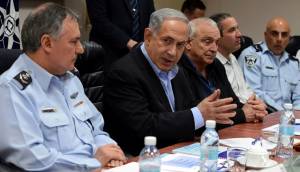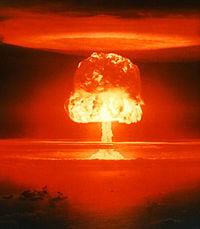Arab countries have found something in common with Israel: They fear the Iranian nuclear threat to the region.
Arab governments are reportedly concerned about the negotiations between the P5+1 powers and Iran regarding Iran’s nuclear program, fearing that a deal with Iran would endanger their own security.
The Wall Street Journal reports that Arab leaders have privately expressed their concerns to Washington. WSJ spoke to Arab and US officials involved in the deliberations, who confirmed this report.
Potential for a Nuclear Arms Race?
The Arab countries are worried that an Iran with nuclear capabilities would set off a nuclear arms race in the region. The Obama administration believes an agreement with Iran would curtail the potential for such a scenario.
There are also reports of talks on the US extending a “nuclear umbrella” to its Middle East allies in order to counter the Iranian nuclear threat.
The major Sunni states, including Saudi Arabia, Egypt, the United Arab Emirates and Qatar, say that a pending agreement could allow Shi’ite Iran, their regional rival, to keep the technologies needed to produce nuclear weapons while, at the same time, many of the sanctions that had slowed down the nuclear build-up would be removed by the US.
“At this stage, we prefer a collapse of the diplomatic process to a bad deal,” an Arab official told WSJ. The unnamed official has reportedly discussed Iran with the Obama administration and Saudi Arabia in recent weeks.
Reports indicate that the Obama administration has agreed to many of Tehran demands, leaving it with threshold nuclear capabilities that would enable it to develop a nuclear weapon within a few months. US officials are quoted as saying that it is no longer plausible to eliminate Iran’s entire nuclear infrastructure, suggesting that any final deal would leave some of their nuclear capabilities in place.
Iran, on its part, denies that it is seeking to build a nuclear bomb, repeatedly claiming that it wants nuclear capabilities for “peaceful purposes.”
US officials stress that they have closely consulted with Washington’s Arab allies about the diplomatic process.
‘Iran Has the Technical Capability’
“Only a good negotiated solution will result in long-term confidence that Iran won’t acquire a nuclear weapon,” a senior US official said.
“Given Iran already has the technical capability, our goal has always been to get to one-year breakout time and cut off the four pathways under a very constrained program,” the official told WSJ.

PM Netanyahu (2L) at Lod Public Security Ministry. (Photo: Haim Zach/GPO)
In this respect, the Arab countries have concerns similar to Israel’s. “The pending agreement with Iran is an agreement that endangers the State of Israel. It leaves Iran with capabilities that will allow it to arm itself with nuclear weapons, one bomb at first and afterwards many atomic bombs. We cannot live with such an agreement; therefore, we oppose it,” Prime Minister Benjamin Netanyahu said in late January, reiterating these sentiments on every possible occasion.
Speaking on Sunday at the Cabinet meeting, Netanyahu repeated the message. ” The coming month is critical for the nuclear talks between Iran and the major powers because a framework agreement is liable to be signed that will allow Iran to develop the nuclear capabilities that threaten our existence. The agreement that is being formulated between Iran and the major powers is dangerous for Israel and therefore I will go to the US next week in order to explain to the American Congress, which could influence the fate of the agreement, why this agreement is dangerous for Israel, the region and the entire world.”
By: United with Israel Staff
Sign the Petition to Stop a Nuclear Iran

The US Congress must ensure that sanctions against Iran remain in force until the nuclear threat is completely eliminated.
I strongly oppose easing sanctions before the nuclear threat from Iran has been eliminated. Allowing Iran to enrich uranium without being subject to 'anytime, anywhere' inspections is extremely dangerous and unacceptable. Iran's nuclear program must be stopped.
